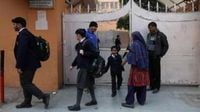April has been a tumultuous month for education in Delhi, as the results of school examinations have been declared and the repercussions are being felt across the board. A significant number of students in government schools, particularly in Class XI, have been detained, raising concerns about the educational practices in these institutions. Meanwhile, elite schools have also taken drastic measures, holding back children in Classes VI and VII, despite the Right to Education (RTE) Act, which bans detention in elementary school, except in Classes V and VIII.
Parents are expressing their frustration and despair as they navigate the complexities of the current education landscape. Many upper middle-class parents have taken to the streets to protest against exorbitant fee hikes imposed by private schools. In a notable case, students from Delhi Public School, Dwarka, faced harassment after questioning the increased fees, leading the Delhi High Court to intervene. The court described the school as operating “like a money-making machine” and prohibited discrimination against students.
In a move that has raised eyebrows, the Delhi Police are set to conduct home visits to children who may have dropped out of government schools. This initiative is part of a broader strategy by the Delhi government, which has mandated the automatic sharing of dropout data with the police every six months. According to a report from April 22, 2025, discussions have taken place regarding the formation of anti-drug clubs, with a focus on tracking down dropouts to “counsel” them towards better career paths. However, this approach has sparked concerns about the stigmatization of these children, particularly those from marginalized communities such as poor Muslim or Dalit backgrounds.
Critics argue that labeling these children as “dropouts” overlooks the systemic issues that push them out of school. Many children do not voluntarily leave education; rather, they are often forced out by a system that fails to accommodate their needs. The educational content can alienate students, making them feel unvalued and disrespected. As one student poignantly noted, “All children should share similar kinds of schools so that poor children can improve their understanding and learn to fight for their rights.”
In light of these challenges, the Delhi government has initiated a study to investigate the reasons behind school dropouts and to explore ways to improve the overall quality of education. The State Council of Educational Research and Training (SCERT) is spearheading this effort, focusing on the impact of RTE entitlements, particularly the PM Poshan scheme, which provides hot meals to students in government and government-aided schools. This scheme is believed to play a crucial role in reducing dropout rates.
The research will also delve into the relevance of teachers in the digital age, especially as artificial intelligence continues to shape educational practices. Furthermore, SCERT is evaluating leadership training programs for school heads, assessing whether they are effectively analyzing enrollment, attendance, and dropout data to make informed decisions that enhance school performance.
Another key area of investigation is the development of methods to measure and improve teacher performance, which is essential for ensuring quality education. Data collection for these studies will involve engaging various stakeholders, including school heads, teachers, students, and parents. Field investigators from SCERT and District Institutes of Education and Training (DIETs) will visit randomly selected schools across Delhi to gather insights.
As the Delhi government grapples with these pressing issues, the overarching question remains: how can the public education system be transformed to provide a viable alternative to the elite private schools that dominate the landscape? The current educational framework has long been criticized for its inequities, which have resulted in a highly stratified system where quality education is often reserved for the privileged.
The RTE Act, which was designed to ensure free and equitable education for all, is not being implemented effectively. The recent National Education Policy (NEP), 2020, contradicts the principles of the RTE by endorsing standardized tests that lead to the detention of students in critical classes. This misalignment raises concerns about the future of education in the country.
Moreover, the NEP proposes pushing a significant portion of students into vocational education at an early age, which some argue limits their potential and undermines the importance of a comprehensive educational experience. Funding disparities further exacerbate these issues, as resources are increasingly directed towards a few exemplary schools while the broader public education system struggles to meet basic needs.
In a society where educational opportunities are often dictated by socioeconomic status, the stark contrast between elite and government schools creates an educational apartheid. Children in elite institutions express sentiments that reflect a troubling mindset, believing that government resources should not be used to educate “poor children” in subjects deemed too advanced for them. This mentality highlights the urgent need for a systemic overhaul to ensure that all children, regardless of their background, receive a quality education.
The current situation calls for a collective effort to advocate for free public schools that cater to every child, dismantling the barriers that perpetuate inequality. The voices of those in government schools must be heard, and their needs addressed with dignity and respect. As the Delhi government embarks on this study, it is crucial to remember that the future of education in India hinges on our ability to create a system that values every student equally and provides them with the tools they need to thrive.

